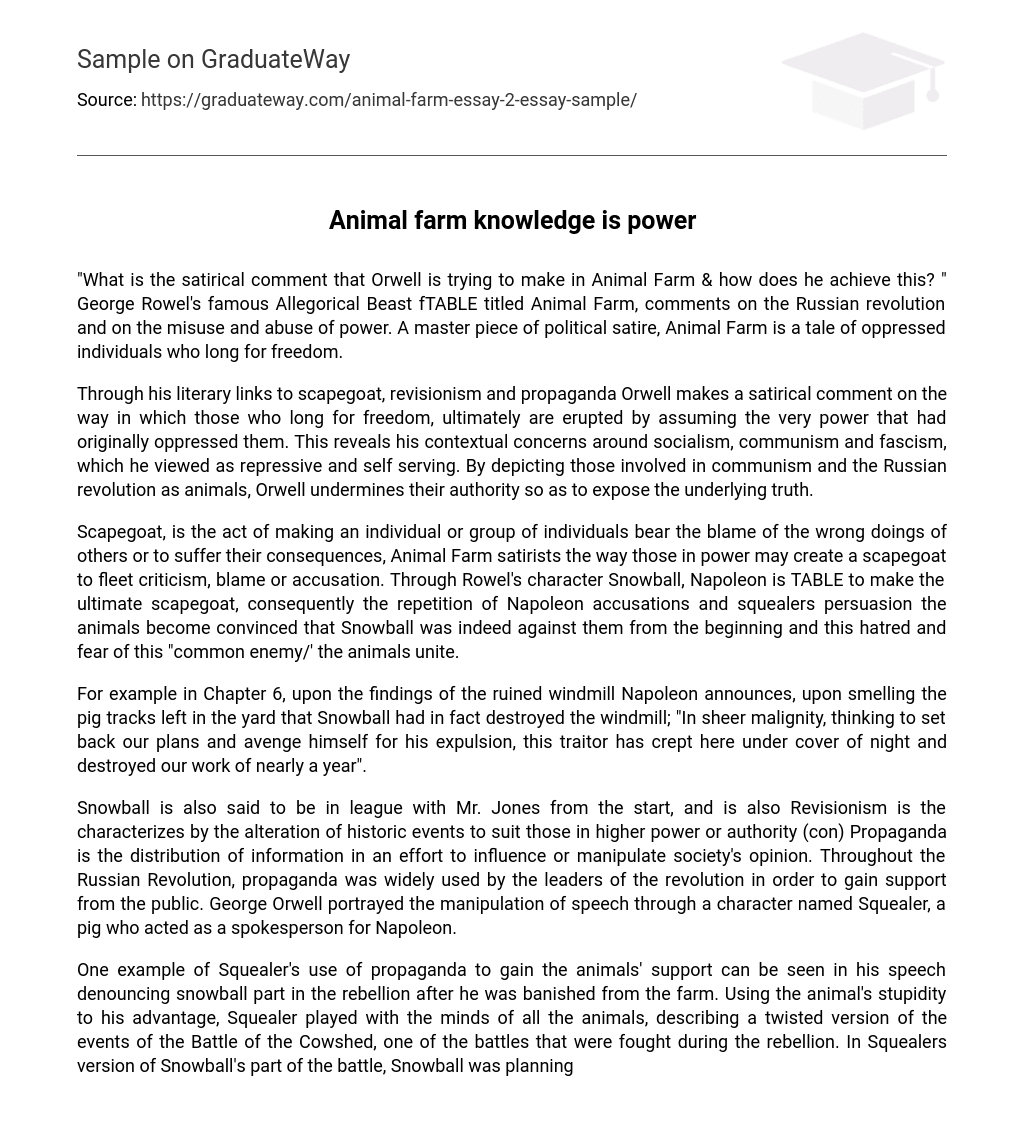“What is the satirical comment that Orwell is trying to make in Animal Farm & how does he achieve this? ” George Rowel’s famous Allegorical Beast fTABLE titled Animal Farm, comments on the Russian revolution and on the misuse and abuse of power. A master piece of political satire, Animal Farm is a tale of oppressed individuals who long for freedom.
Through his literary links to scapegoat, revisionism and propaganda Orwell makes a satirical comment on the way in which those who long for freedom, ultimately are erupted by assuming the very power that had originally oppressed them. This reveals his contextual concerns around socialism, communism and fascism, which he viewed as repressive and self serving. By depicting those involved in communism and the Russian revolution as animals, Orwell undermines their authority so as to expose the underlying truth.
Scapegoat, is the act of making an individual or group of individuals bear the blame of the wrong doings of others or to suffer their consequences, Animal Farm satirists the way those in power may create a scapegoat to fleet criticism, blame or accusation. Through Rowel’s character Snowball, Napoleon is TABLE to make the ultimate scapegoat, consequently the repetition of Napoleon accusations and squealers persuasion the animals become convinced that Snowball was indeed against them from the beginning and this hatred and fear of this “common enemy/’ the animals unite.
For example in Chapter 6, upon the findings of the ruined windmill Napoleon announces, upon smelling the pig tracks left in the yard that Snowball had in fact destroyed the windmill; “In sheer malignity, thinking to set back our plans and avenge himself for his expulsion, this traitor has crept here under cover of night and destroyed our work of nearly a year”.
Snowball is also said to be in league with Mr. Jones from the start, and is also Revisionism is the characterizes by the alteration of historic events to suit those in higher power or authority (con) Propaganda is the distribution of information in an effort to influence or manipulate society’s opinion. Throughout the Russian Revolution, propaganda was widely used by the leaders of the revolution in order to gain support from the public. George Orwell portrayed the manipulation of speech through a character named Squealer, a pig who acted as a spokesperson for Napoleon.
One example of Squealer’s use of propaganda to gain the animals’ support can be seen in his speech denouncing snowball part in the rebellion after he was banished from the farm. Using the animal’s stupidity to his advantage, Squealer played with the minds of all the animals, describing a twisted version of the events of the Battle of the Cowshed, one of the battles that were fought during the rebellion. In Squealers version of Snowball’s part of the battle, Snowball was planning to “leave the field to the enemy”.
Afterwards, Squealer described how Napoleon was the one who “sprang forward with a cry of ‘death to humanity! ‘ and sank his teeth into Mr. loner’s leg”. During his speech, Squealer describes everything in so much detail that it “seemed to the animals that they did remember it”. As a result, Squealer has used propaganda to manipulate the memories of the animals so they would believe that Napoleon is the rightful person to trust and Snowball was actually on the side of the enemy.
George Orwell successfully uses propaganda in his Allegorical Beast FTABLE to express his opinion on how the communist system of the Russian Revolution gradually went from an equal system, to a system that was overcome by greed and dishonesty. Another form of propaganda is shown when the pigs begin to twist the seven commandments of Minimalism. At the start of the revolution, the sixth of the seven commandments read “No animal shall be killed by any other animal”. However, in order to reason with the animals after killing those who opposed Napoleon, the rule has been hanged to “No animal shall be killed by any other animal without cause”.
As a result, Napoleon’s actions for eliminating those animals were justified because the animals thought a few words from the commandment was slipped from memory. Since the other animals were not as clever compared to the pigs and Were not as capTABLE of thinking for themselves, the animals used the seven commandments as an agreement to what was right and what was wrong. Therefore, when the pigs changed the seven commandments, the animals did not think badly of Napoleon’s misuse of his authority.





